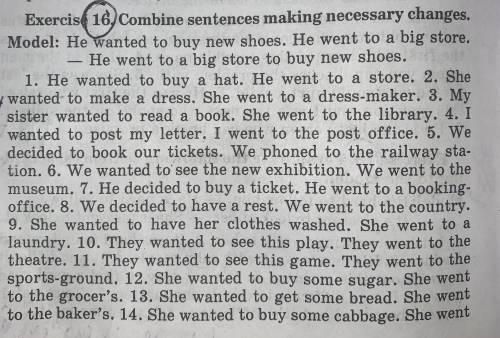Combine sentences making necessary changes


Другие вопросы по теме Английский язык
Популярные вопросы
- Найди значение выражения 16*x-320=80 решите выражение...
2 - Как увеличивалась территория московского княжества на протяжении 14-...
3 - Как определить какая форма у глагола определенная и не определенная...
2 - Что робинзону крузо преобразовать необитаемый остров?...
2 - 4из двух пунктов расстояние между которыми 840 км одновременно на встречу...
3 - Вшколе 810 учеников,2,3 обучается в средней и старшей школе.сколько...
2 - Сколько пройдёт часов,если: маленькая стрелка сделает 2 оборота&...
1 - Решите уравнение: 9,116: (1,9 - х) = 5,3...
3 - Школьный текст на , кем я хочу стать...
1 - Во время водяного перемирия на водопой к реке вайнгунге пришли 135 буйвалов...
3
ответ: 1. He went to a store to buy a hat. 2. She went to a dress-maker in order to make a dress. 3. My sister went to the library to read a book . 4. I went to the post office to post my letters. 5. We phoned to the railway station to buy a ticket. 6. We went to the museum to see the new exhibition. 7. He went to a booking-office to buy a ticket. 8. We went to the country to have a rest. 9. She went to the laundry to have her clothes washed. 10. They went to the theater to see this play. 11. They went to the sports-graund to see this game. 12. She went to the grocer's to buy some sugar. 13. She went to the Baker's to buy some bread. 14. She went to the greengrocer's to buy some cabbage. 15. He went to a ready-made clothes department to buy a new suit. 16. She went to a hosiery department to buy stockings.
Объяснение: чтобы выразить "для того, чтобы/чтобы" можно без разницы в значении употреблять to и in order to.